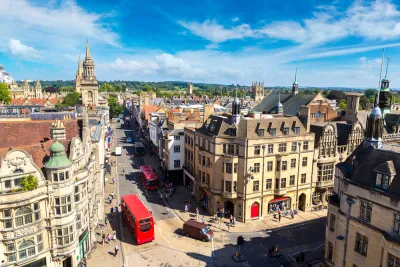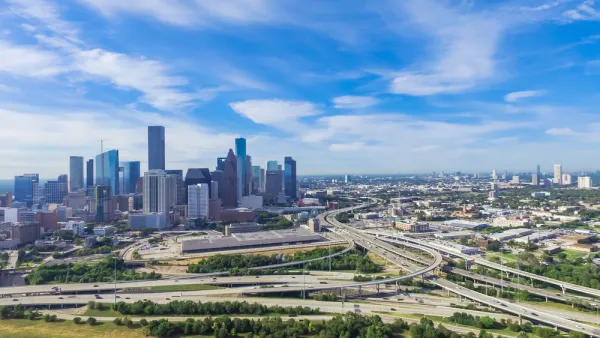Proposals for road diets, ‘15-minute cities,’ and other traffic reduction programs often meet with unfounded conspiracy theories claiming that the plans are nothing short of steps to world domination.

Pointing to an example from Oxford, England, The Guardian’s Peter Walker explores why conspiracy theorists are drawn to traffic calming plans, claiming there are more sinister reasons behind them.
According to the theories, promoted by far-right Canadian psychologist Jordan Peterson, among others, “Oxford’s traffic plan, they insist, is the first step in a global plot led by – depending on who you listen to – the World Economic Forum (WEF) or the UN, designed to strip people of their fundamental rights and personal possessions in the name of the environment.” Walker first debunks the claims. “It is worth stressing that no trip will be impossible, though some could be longer than before, with drivers instead having to use a less central route such as the city’s ring road.”
According to Walker, conspiracies connected to cars and traffic abound in part because “efforts to limit people’s right to drive, whether in previous years through residents’ parking zones, or more recently with low-traffic neighbourhoods, have often prompted a furious response, usually from a noisy minority.” These fears tie in with “climate conspirators,” who believe climate change is an elaborate scheme to bring the world under the control of an international cabal.
Why should we care about a small group of people believing absurd claims? “One significant worry is that people objecting to traffic restrictions can easily become exposed to much murkier ideas,” Walker explains.
FULL STORY: Why do traffic reduction schemes attract so many conspiracy theories?

Analysis: Cybertruck Fatality Rate Far Exceeds That of Ford Pinto
The Tesla Cybertruck was recalled seven times last year.

National Parks Layoffs Will Cause Communities to Lose Billions
Thousands of essential park workers were laid off this week, just before the busy spring break season.

Retro-silient?: America’s First “Eco-burb,” The Woodlands Turns 50
A master-planned community north of Houston offers lessons on green infrastructure and resilient design, but falls short of its founder’s lofty affordability and walkability goals.

Test News Post 1
This is a summary

Analysis: Cybertruck Fatality Rate Far Exceeds That of Ford Pinto
The Tesla Cybertruck was recalled seven times last year.

Test News Headline 46
Test for the image on the front page.
Urban Design for Planners 1: Software Tools
This six-course series explores essential urban design concepts using open source software and equips planners with the tools they need to participate fully in the urban design process.
Planning for Universal Design
Learn the tools for implementing Universal Design in planning regulations.
EMC Planning Group, Inc.
Planetizen
Planetizen
Mpact (formerly Rail~Volution)
Great Falls Development Authority, Inc.
HUDs Office of Policy Development and Research
NYU Wagner Graduate School of Public Service




























